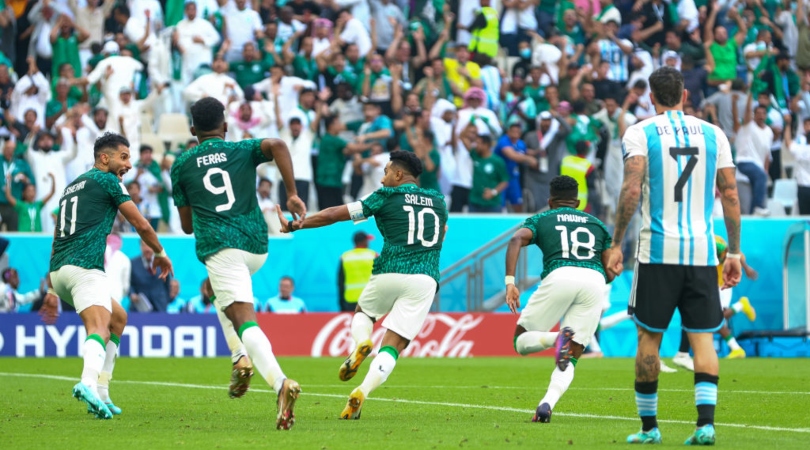Saudi Arabia's win against Argentina mathematically ranked as World Cup's most unlikely ever victory
The Asian nation were given just an 8.7 per cent chance of beating Argentina in their Group C clash

Saudi Arabia's 2-1 win against Argentina in Group C of World Cup 2022 has been calculated as the most unlikely World Cup football match victory in the history of the tournament, the Asian nation given just an 8.7 per cent chance of beating the South American side.
The data, published by entertainment metadata company Gracenote - which is owned by Nielsen - used a proprietary football ranking system to identify the most shocking wins throughout the World Cup's existence.
Prior to Saudi Arabia's victory over Argentina, USA’s win over England in 1950 was the most unlikely triumph ever recorded in the World Cup, with the USA given a 9.5 per cent chance of taking the spoils.
Gracenote’s Football Rankings use ratings measuring team strength to estimate the probability of a win or draw for each team in the World Cup. Matches won in normal time by the underdog with the smallest percentage chance of winning, according to these estimates, are identified as the biggest shocks.
As Gracenote describes: "Every time two teams compete, one wins points from the other depending on the result, the winning margin, who is at home and the relative strength of the two teams playing. We also weight the number of points which change hands by the importance of the competition, so World Cups and continental championships are the most important and friendlies the least important.
"So, for example, if Brazil (ranked number one) wins a friendly on neutral ground against 30th ranked Costa Rica 1-0, Brazil will improve its rating by relatively few points, because that result is more or less expected. If, however, Germany beats Brazil 7-1 at a World Cup in Brazil, Germany's rating will improve considerably at the expense of Brazil's as both are strong teams and the final result, as well as the winning margin, are something of a surprise."
Consequently, Saudi Arabia were given a very small chance of beating Argentina, but beat them they did. Saleh Alshehri and Salem Aldawsari scored in the second-half to hand Saudi Arabia the victory, after Lionel Messi had put Argentina 1-0 up in the first-half.
Get FourFourTwo Newsletter
The best features, fun and footballing quizzes, straight to your inbox every week.
Also among the list of most shocking wins at the World Cup is Switzerland's 1-0 victory over Spain at World Cup 2010. Spain managed to recover from the defeat and become the first nation to lose their first World Cup fixture and still go onto win the tournament as a result.
The 1982 World Cup had a couple of surprises, too. Algeria beat West Germany 2-1, while Northern Ireland ran out 1-0 winners against hosts Spain.
Perhaps surprisingly on the list is Ghana's win against Czech Republic in 2006. The African nation were given just a 13.9 per cent chance of winning, with that tournament in Germany their debut World Cup appearance. Uruguay beating Brazil and Wales scraping past Hungary - both 2-1, in 1950 and 1958, respectively - also feature in the top ten biggest shock wins.
Meanwhile, Germany's failure to progress from the group phase for the first time since 1938 at the 2018 tournament was a major shock, not least because of their 2-0 loss to South Korea. However, one of the most iconic victories is Senegal's 1-0 win against France at the 2002 World Cup.
France were the reigning champions and entered the tournament as one of the favourites, while Senegal were comprised of relatively unknown players. Senegal managed to progress to the quarter-finals, with France finishing plum last in the group.

Ryan is a staff writer for FourFourTwo, joining the team full-time in October 2022. He first joined Future in December 2020, working across FourFourTwo, Golf Monthly, Rugby World and Advnture's websites, before eventually earning himself a position with FourFourTwo permanently. After graduating from Cardiff University with a degree in Journalism and Communications, Ryan earned a NCTJ qualification to further develop as a writer while a Trainee News Writer at Future.
